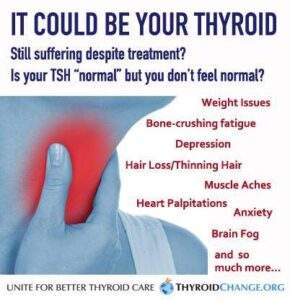By Lyn Hacker
Special to NKyTribune
A friend of mine has challenged me to write about something I deal with on a daily basis. It is my thyroid. He challenged me because January was Thyroid Awareness Month. He has also suffered from this condition, and nearly gone into congestive heart failure because of it. He wants me to state categorically, it is very serious and affects men as well as women.
That said, my old friend, there’s not enough room to write about it here as extensively, or as medically, as is needed to explain it all. There are so many intricacies to the condition, and it affects different people in different ways. But here is something to take note of: According to LifeWorks Wellness Center: “On a global scale, a staggering 200 million people have problems with their thyroid glands, with over 50 percent remaining undiagnosed. In the US alone, the instance of thyroid disease is running close to epidemic levels and equally as worrying is the number of undiagnosed or misdiagnosed cases.”
Take home lesson– if you are feeling any of the following: weight issues, bone-crushing fatigue, depression, hair loss/thinning hair, muscle aches, heart palpitations, dry/itchy skin, anxiety, brain fog, problems conceiving or carrying pregnancies, and/or chronic pain – see a good doctor and ask for a thyroid panel.
My friends on Facebook have noticed I’ve substituted a thyroid ribbon for my usual profile photo. This is because January was National Thyroid Month, and I’ve shared bits and pieces of articles about thyroid problems on my status all month long, including some helpful articles from thyroidchange.org.
But I’ve not really written about what it’s like to deal with this on a daily basis. I hesitate to write about it – I’m embarrassed by it, although I don’t know why. It wasn’t my fault. It wasn’t brought on by bad living. I’m not seeking pity. But I’m becoming more and more aware of what an epidemic it’s becoming, and how people are suffering from its affects. I feel compelled to speak up, so that maybe I can help someone else.
It’s not ‘in your head’
This disease also affects men on a large scale. But if you are a woman, prepare to meet obstacles getting the correct diagnosis and treatment, including being sent to a psychiatrist. It is sad but true, many doctors still feel it is “all in your head.”
I am over 60 now, and beyond such foolishness.
When I was in my early 40’s, I developed Graves Disease, which is an acute form of hyperthyroidism. Manifesting in “thyroid storms,” it was a walk through Hell. My heart raced and jumped around like it was going to explode. I couldn’t sleep and my hands, (and at times my whole body), shook so badly that even strangers noticed and commented on it. (“Honey, are you okay?”).
I was working at a horse farm then. It was during foaling season and I was on the foaling crew and assisted the veterinarians with the mares and foals as needed. One vet noticed and remarked on the fact that I was unable to connect IV tubing due to my hands shaking. Jokingly he asked if I was suffering from DTs, but later pulled me aside, and in private, told me I should see a physician (he knew I didn’t drink that much!). He had recognized the signs.
I did, and that is where my problems got so much worse, because the doc wasn’t a good one. He did the first part of everything properly. He tested me for antibodies and diagnosed the Graves Disease, but that is where things went south. Without educating me at all about the condition, or offering me any other options, he recommended radiation ablation of my thyroid gland, which killed it. I did it because he had convinced my mother I could die and she was freaking out. He then sent me back to work with a dying thyroid, and finally prescribed synthroid for me without taking any blood tests. I was advised to return in a year.
Unbeknownst to me, my life had changed forever. There is this thing called TSH, thyroid stimulating hormone, that your body secretes, which tells the thyroid gland exactly how much thyroid hormones (T3/T4) your body needs to do its thing. The medication is supposed to replace that. How does the doctor know? He/she tests the TSH and hopefully some other markers. Most of the time when a person develops hyperthyroid problems (Graves Disease, Hashimoto Syndrome, etc.), the thyroid ablation and supplemental hormone solves the problem.
But there are a few of us who have TSHs that “swing,” and by swinging, I mean swing from one extreme to the other, for absolutely no reason that I, or my “new” doctor, in the 20 years hence, have been able to figure out.
Looking for a solution
In the meantime I’ve seen three specialists, who also couldn’t offer an explanation. I’ve spent entire years hypothyroid, (dull, foggy, gaining weight, itchy, cold, apathetic), being routinely tested (more often than once a year, I might add), and having medication changes that didn’t get me back to “normal.” I’d then become hyperthyroid, (heart racing and jumping, shaky, hot, insanely hungry, brain flying through hyperspace, sleepless) and spend the next year trying to get “normal” again. 2014 was another of those years – hypothyroid from January to October, where I evened out for two months, then went hyper.

It’s truly too painful to describe how this darkens your mind, heart and soul, how it “changes” you. I find I’m always second guessing myself, and my confidence has truly suffered. I feel like I have dissociation episodes and at times truly wonder who I am, and not in an existential sense. In a way, when you’re hypo, it is like you are slowly dying. (Without your medication, you will become comatose). Hyper, you wonder which next run of tachycardia will be your last. Worst of all is you can’t control any of it. You’re hopefully working with a doctor who truly cares, but you’re tied to a blood test and that comes down once every two months, if you’re lucky. Imagine spending a year like that. Or 20.
Lots of people do, and it’s not in their heads.
Before the ablation, when I had a problem, I solved it. Didn’t like the situation? Got out or changed it. Got fat? Lost weight. I had control over my life. For better or worse, it was up to me.
Now that most basic control has been wrenched out of my hands, and I’ll never have it again. I can gain weight on 1,000 calories a day. Or I can do every relaxation exercise I know and still shake like a leaf.
Hypo, an insidious apathy takes over, because it seems you need some sort of metabolic activity in your body and brain to actually care about things. There is the horrible brain fog you have to fight through over the tiniest little things – times when you leave a place and think you are turning one way, but instead turn another, and wind up two towns away. There is not being able to remember the name of a street where you used to live. There is not being able to remember a word you need – you plug in synonyms on Google Search to find it. Bills and appointments must be posted on a calendar, and the phone alarm has to remind you to check the calendar every day.
It’s like you’ve become one of the most inadequate, incapable people you can possibly think of, totally unable to handle or do the simplest things. Hyper, you become hyper vigilant about everybody and everything. Worrying and anxiety becomes nonstop. In short, everything you thought you were, or could be, has vanished via the next round of tests.
There is no second wind.
My doctor now would laugh at me for saying this, but I swear it’s true. It’s like you take a little pill of energy in the morning, and when it’s gone, it’s gone. As in kaput. You tire easily, and you’ll remain that tired till the next morning. There’s no spending one moment longer, nor adding one more thing in. There’s never going one more mile nor one more minute. When it’s spent, it’s spent, and you don’t recover until after you take your next dose of Synthroid.
I’m not prone to talking about my problems, especially in a public forum, but this has affected me for so long, I can’t stand the thought of others suffering in silence with it. That’s why I partnered with thyroidchange.org to help get the word out.
If any of this sounds like you, male or female, check with a doctor and get those panels done. If the doctor isn’t willing, go to another one. If your insurance doesn’t cover it, pay for it out of pocket. Find a way. Find someone who will work with you to get the answers you need, and to make the changes to regain your life. Because it is your life that’s wasting away, adrift in a sea of confusion, pain, fatigue and guilt spent over not being able to be who others think you should be, or who you think you should be.
I am so thankful for the wonderful doctor I have now, who has brought me as close as I have been, in the past 20 years, to “euthyroid, or “normal.” Good doctors are out there, though you may have to look for them.
For assistance, check out www.thyroidchange.org, which has many ways to help, including an interactive section that enables you to find the right doctor for you. These doctors have been chosen for their willingness to order full thyroid labs as well as take into account patient symptomatology.
They can help you figure it out. It’s a whole, new world.

Lyn Hacker is a Lexington native raised by Appalachian parents to be not only educated but proficient in the living arts – working very hard, playing music, growing gardens, hog farming, orchard management and beekeeping. The UK graduate has been a newspaper staff writer and production manager, a photography lab manager, a Thoroughbred statistics manager, a Bluegrass singer and songwriter, a registered respiratory therapist, a farmer, a Standardbred horsewoman, a Red Barn Radio promoter and a beekeeper. She lives on a farm in Sadieville.


















Everything you said is right on point. There are websites that talk about how hard it is to deal with someone who has Graves’ disease but hardly any that describe in more detail what it’s like to live with it. I wish there was more understanding of this terrible disease and it’s affects physically, psychologically and emotionally. It can feel very lonely as a result. Thank you for bringing attention to life with Graves’ disease.
Dear Lyn
As others are saying in this thread, you have described my life! I feel fortunate, living in the UK, that our NHS service has been fantastic in terms of helping me manage my Graves & its symptoms. However, the disease has changed me & I was not prepared for the longer term impact on my mental health as well as physical well-being!
I can see these posts are old ones, but hopefully you are still out there, keeping well enough & raising awareness of the impact of Graves – that continues even post treatment.
Lyn, thank you for putting this into words. I suffered for over 20 years with hypothyroidism. Treated with Synthroid based on TSH tests only. Complained all that time of symptoms but I didn’t realize they were coming from my thyroid disease and no doctor clued me in. Sent to all kinds of specialists who could find nothing wrong with me. Was placed on antidepressants. A few years ago an acupuncturist looked at my list of symptoms and told me they were all coming from my thyroid and a lightbulb went off. Since then I’ve advocated for myself. It’s a constant struggle. I’m now taking T3 in addition to T4 but it’s still a balancing act and it’s frequently out of balance. It’s a horrible disease.
Going through the doctors know nothing circus …
I flip flop between Graves and Hashimoto’s…
It is a hideous disease.. and the women who suffer through this are not supported in the medical community..
Thank you all for your comments. The more I talk about it, the more people I run into who are going through a similar scenario. It’s hard to find good doctors because the number of physicians is decreasing while patient numbers are increasing. Also insurance doesn’t want to cover all that’s involved in it, and doctors are already underpaid by insurance companies. It can involve a lot of doctor visits, blood tests and frequent medication changes. I try to do my part by educating myself as much as possible regarding such things as new therapies, or what blocks the action of thyroid medication, (because there are a lot of substances out there that do, such as soy, calcium, cruciferous vegetables such as broccoli, spinach, etc.). I take my meds at a certain time every day, always on an empty stomach and wait at least two hours before eating. I do every thing I can do to control my circumstances so that the TSH swings are not caused by me, or rather, my actions. (What my body does on its own, I can’t control). It’s very important to constantly learn more by talking with people, research, etc., plus it helps to know you’re not alone. The most important thing I’ve learned is to be eternally grateful for my friends and family who can accept me for the way I am, the light and dark of it, and don’t hold it against me. I’ve stopped wasting time and energy blaming myself and instead support myself, and in turn, others. It is a struggle that will make you intimately aware of your strengths and limitations, while making you appreciate the struggles of others, and making your more compassionate towards everyone.
Thank you for so eloquently writing about what many suffer from but don’t typically talk about. I had Graves’ disease and was treated with thyroid ablation through radioactive iodine therapy. My life was never the same after. In light of anti-thyroid producing drugs having a better over all outcome do you see the need to advocate for that type of treatment over the radioactive iodine treatment? If I had to it all over again I wish I would have at least attempted the course of anti-thyroid producing medications. Thank you again for writing this article. It definitely makes it clear that thyroid disease is not just a “take a pill for the rest of your life, you’ll be fine “ disease.
Good morning Lyn,
I know this article is years past and I’ve read SOOOOO many trying to gain any useful information about this HORRIBLE disease and your story is a testimony for so many of us. You NAILED IT!! I’m so sorry for all that you’ve been through & the personal struggles you had to deal with. It seems neverending & often times overwhelming. Thank you for sharing!! Thank you for giving hope to so many that are suffering day and night. I’m broken & exhausted. I feel like a failure & my life has been turned upside down & all around. So many take for granted what they have. I feel like I’ve lost so much physically, mentally, emotionally, financially my only relief is by my faith in the Lord Jesus. There’s very few who understands these issues including doctors something I just find extremely frustrating & unbelievable. Again thank you for bringing awareness & your personal struggles to this very “REAL” disease. I pray this will find you doing beautifully. Prayers and God bless.
I am suffering from Hashimotos Disease for the past few years and have a similar story to yours.
Last Sep I went on the Hypothyroid Revolution Diet and it has been fantastic. I am not totally back to my self and still have symptoms but I feel 80% better. My energy levels are up and I am back living a normal life again ( or as near as possible with Hashimotos DIsease ).
Check it out, you won’t regret it. It is a very healthy diet.
Best of luck
Regards
Vincent
This is a very interesting article.
It is exactly the same as my situation
Thank you Lyn for your article. I did go to thyroidchange.org to find a doctor that would treat me. The main problem I found is that most do not accept insurance. The doctors that do take insurance want nothing to help prevent issues. It has been one year since the PA that was treating me sent me a letter informing me she would not accept insurance. The reason was she couldn’t get paid enough for her services.
Thank you, thank you, THANK you for writing this! You have just described my life in one article. I too swing back and forth between hyper and hypo and have the antibodies for both Graves and Hashimoto’s. My last really good Endocrinologist referred to me as a HashiGraves sufferer and told me it’s uncommon, but happens. My thyroid was removed 2 years ago and though the symptoms have gotten better, I am by no means “me” and am beginning to believe that I will never be again despite all the blood tests and natural desiccated thyroid replacement (I have additional symptoms with synthroid) in the world.